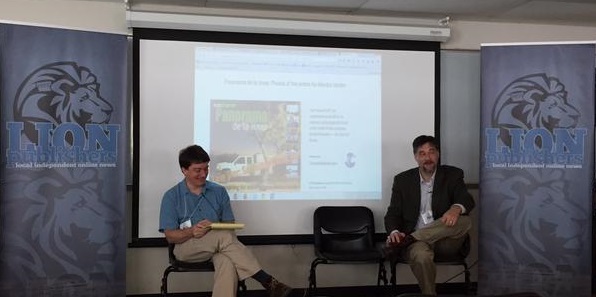Crowdfunding can help independent news sites do that ‘extra’ thing
Independent local news sites are turning to crowdfunding for projects that don't fit into the annual budget.

Finding a sustainable mix of revenue to support year-to-year operations can be a challenge for independent local news sites. And in the midst of that struggle, it can be difficult to find the resources to tackle a new project, report on a big, intensive story or acquire new technology.
That’s where the concept of crowdfunding can come in, journalism entrepreneurs gathered for LION Publishers’ “Independents’ Meeting” in Philadelphia on Sunday were told.
Several LION members talked about recent experiences using services such as Kickstarter and Beacon to fund projects they couldn’t fit into their annual budgets.
Charlottesville Tomorrow's crowdfunding projects have included an effort to expand into covering local schools, which raised more than $17,000, and a project to build 3D models of a major local transportation project, which raised more than $7,000.
TucsonSentinel.com raised more than $15,000 in a Kickstarter campaign for a project to photograph the entire Arizona-Mexico border.
The Lo-Down just successfully wrapped up a crowdfunding campaign focused on “solutions journalism” around the survival of small businesses on Manhattan’s Lower East Side.
Brian Wheeler of Charlottesville Tomorrow and Dylan Smith of TucsonSentinel.com, who will be leading a free webinar for LION members on crowdfunding July 8, offered tips on how to meet crowdfunding goals and engage with donors.
Wheeler, whose site is nonprofit, said it’s important to time crowdfunding efforts so they don’t conflict with other fundraising efforts.
But crowdfunding can be used by for-profit journalism organizations as well, and depending on the project or niche, can sometimes appeal to and gain support from individuals who wouldn’t necessarily give to the site otherwise.
Smith’s goal for the photography project was $5,000, and the site ended up raising three times that amount. Crowdfunding efforts aren’t usually that easy, and it’s important to lay groundwork with potential donors before the campaign begins. Kickstarter, for example, requires that you raise your entire goal in the typically 30-day time period that is set in order to collect any of the funding. Publishers should line up a patron or two to kick in the last $500 or $1,000 at the last minute if the effort falls slightly short.
Wheeler said the having a strong track record in the community, being generous in supporting others’ crowdfunding efforts and producing a good video about the project were all keys to Charlottesville Tomorrow’s success. It also helped that they had a mailing list of 10,000 engaged local people to solicit.
Smith said publishers can be creative in offering “rewards” for certain levels of giving. For his border photography effort, those included prints of photos, a book of photos and even a ride-along with journalists doing some of the work. “Experience” rewards – such as coffee with the editor – can be effective, or the option to donate advertising space on your site to a nonprofit organization the donor supports.
Wheeler said that it’s OK also to offer a giving category that includes no reward other than seeing the project happen. He was surprised by how many donors didn’t really want a free T-shirt, but just wanted to support the work.
There is a limit to how many times a publisher can go to the well with crowdfunding efforts. The Tucson Sentinel ran two campaigns a month apart, and Smith said he felt like that hurt their success.
It also depends on whether you are targeting the same kinds of donors. Different people can be interested in different projects.
Charlottesville Tomorrow has run three crowdfunding campaigns in four years, but except for the education reporter position, they have all been for different, one-time projects.
For more information about crowdfunding of journalism projects, check out case studies written about at the Geraldine R. Dodge Foundation’s local journalism site, or check out “Through the Cracks,” a site devoted to crowdfunded journalism.
And LION members can hear directly from Wheeler and Smith in their July 8 webinar. Sign up here.
Here are some of their journalism crowdfunding tips:
Crowdfunding journalism tips
Sign up for the weekly newsletter
Join the LION mailing list to get our weekly roundup of opportunities and resources for news entrepreneurs. View our most recent issues.
Related Articles
LION members now have free access to new AI-powered tools from Rolli
These tools can help members track disinformation, find experts, meet deadlines, and more.
How our 2024 member survey is informing programming and benefits
We’re prioritizing more opportunities for members to network and learn.
10 things I’ve learned about independent publishing since launching Billy Penn in 2014
Some of the challenges LIONs face are the same, but the landscape looks very different a decade later.
